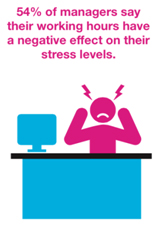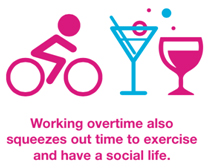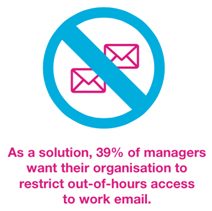According to the latest CMI research, poor leadership is driving managers to working an extra 29 days every year, cancelling out their annual leave. Managers are working longer hours than ever before, leading to increased stress as a result of the ‘always on’ culture that is dominating UK offices.
 Not surprisingly, those working long hours are more than three times as likely to report they feel stressed than those working no additional hours; 54% of managers said that long working hours increase levels of stress in workers.
Not surprisingly, those working long hours are more than three times as likely to report they feel stressed than those working no additional hours; 54% of managers said that long working hours increase levels of stress in workers.
The report shows that by eating into the time available to relax, exercise and socialise, long-hours prevent managers being able to unwind. Managers surveyed for the study report a link between working longer hours and suffering from increased headaches, irritability and insomnia, early symptoms of mental health problems and potential burnout.
Effective management is found to be a key factor in handling stress in the work place; the worst management styles are shown to generate up to four times more stress than the best, with 28% of those reporting that their line managers are “secretive” or “suspicious” feeling stressed, compared to just 7% of those who believe their managers empower them to take their own decisions.
By contrast, innovative, entrepreneurial and empowering management styles were found to drive job satisfaction levels up to 2.5 times higher than ‘command and control’ styles.
 In addition to poor line management, technology is also contributing to managers’ stress levels.
In addition to poor line management, technology is also contributing to managers’ stress levels.
Mobile technology in particular was cited, with 61% of managers stating that it makes it hard to switch off from work. More than half of managers (54%) frequently check their emails outside normal working hours, with 21% checking it ‘all the time’. The report states: “Most of us are comfortable with the idea that a modern workplace requires us to occasionally pitch in out of hours. But the ‘always on’ culture must be switched off, with line managers encouraged to support an ‘always willing’ mind-set that reflects the give and take necessary for a higher quality of working life.”
Despite the rise in hours and the resulting stress, managers’ job satisfaction is on the up. More than two-thirds (67%) of managers are currently satisfied with their jobs, a rise of 12% on 2012, and higher than the 62% recorded in 2007 before the financial crash.
 Positive feelings are associated with trust in their line manager (79%), a belief in their organisation’s values (64%) and a feeling of fair treatment by their employer (61%).
Positive feelings are associated with trust in their line manager (79%), a belief in their organisation’s values (64%) and a feeling of fair treatment by their employer (61%).
The report states “Businesses should be on alert for signs of burnout. Stress is a natural reaction to challenging conditions, and while it can raise motivation and help individuals meet deadlines in the short-term, over longer periods is extremely damaging.”
“Festering resentment at our long-hours culture risks boiling over and hurting UK productivity. Striking the right balance is crucial, requiring managers to act equitably and with empathy.”



